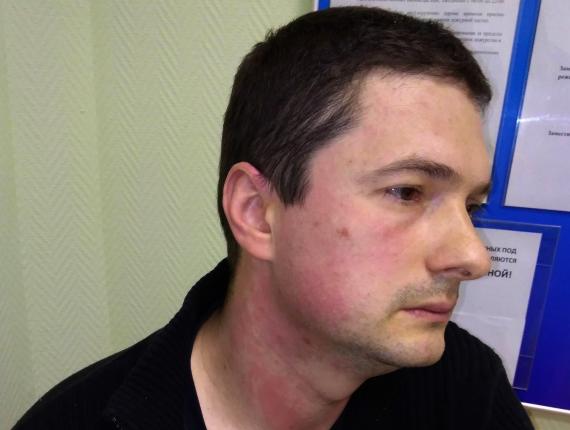St. Petersburg resident Pavel Zlomnov, charged with justifying terrorism while on remand, is a political prisoner, Memorial says
After he complained about the use of torture to him, he was accused of justifying terrorism, which allegedly consisted of reading poems to cellmates.
Pavel Zlomnov, a resident of St. Petersburg who worked as a driver in the government-run Smolninsky transport company serving the St. Petersburg legislative assembly, has been charged with committing offences under Article 222, Section 2 (‘Illegal acquisition, transfer, sale, possession, transport or carrying of a weapon, its main parts or ammunition, committed by an organised group,’ the maximum sentence for which is eight years’ deprivation of liberty), and Article 205.2, Section 1 (‘Public justification of terrorism or propaganda of terrorism’), of the Russian Criminal Code.
Pavel Zlomnov has been held on remand since 31 January 2018 on a charge of illegally selling weapons and, according to human rights defenders, has been subjected to torture by FSB officers from the St. Petersburg and Leningrad region. Zlomnov should have been released on 30 January 2019 when the term of his detention expired, but he was remanded in custody again on charges of allegedly justifying terrorism while in the Gorelovo pre-trial detention facility No. 6. According to the FSB, on 31 October 2018, the day a 17-year-old anarchist blew himself up in the entrance hall of the Arkhangelsk regional FSB headquarters, Zlomnov allegedly ‘called the person responsible […] «a real national hero," publicly stating to those in detention with him […], including in verse, that the ideology of violence and the use of violence to influence decision-making by national and local government or international organisations, through the terrorisation of the population or other forms of illegal violent actions, should be supported and imitated.’
Memorial Human Rights Centre has not studied the case against Pavel Zlomnov and other persons under Article 222 of the Russian Criminal Code (which has very likely been fabricated, judging by the fact that even after one year of investigation the case has not gone to court because of the weakness of the available evidence). However, the circumstances of the prosecution of Pavel Zlomnov for justification of terrorism, as published in the media and stated by human rights activists, and confirmed by procedural documents, make it very probable that the case has been fabricated. The fact that a suspect, who has accused FSB officers of torturing him and other suspects in the case, has been charged by the FSB with committing a crime under Article 151, Section 2, Part 2, of the Russian Criminal Code is problematic. This is all the more true given that the remand centre, where the suspect allegedly committed the crime, is reputed to be a place where torture is committed and as having a so-called ‘press hut’ used to ‘work over’ detainees who refuse to cooperate with investigators.
The only evidence of Zlomnov’s guilt the authorities possess is testimony by other detainees in the remand centre (which would make any potential conviction in clear contradiction with the principle of the presumption of innocence) and handwritten verses against the FSB, allegedly written by Zlomnov in his cell. At the same time, one of the investigators in the case of alleged justification of terrorism by Zlomnov has been FSB Major A. B. Zyk. Major Zyk took part in Zlomnov’s arrest in the first case and has been accused by Zlomnov of using torture. According to Novaya gazeta in St. Petersburg, one of Zlomnov’s fellow drivers at the Smolninsky transport company, a former FSB officer, when questioned by a lawyer acting on behalf of Zlomnov said Major Zyk had tried to make him give false testimony against Zlomnov and had complained that Zlomnov was refusing to give evidence needed by the investigation, despite the use of torture against him.
Meanwhile, the prosecution of Zlomnov is taking place amid on-going scandals and accusations of torture against the FSB in St. Petersburg and Leningrad region following the documentation early in 2018 by members of the St. Petersburg Public Oversight Commission, Yana Teplitskaya and Ekaterina Kosarevskaya, of numerous instances of the worst violations of human rights by the FSB. The human rights activists recorded instances of torture by FSB employees in at least six criminal investigations involving at least 14 people.
There is every reason to believe that the only reason the criminal investigation under Article 222 of the Russian Criminal Code was initiated against Pavel Zlomnov was the fact he told human rights activists about the torture against him and other suspects in the case. The probable motive for the FSB’s prosecution of Zlomnov is the desire to prevent his release, thereby also intimidating the other victims of torture and taking revenge against him for his allegations. This approach is also illustrated by the opening of a criminal case against Pavel Zlomnov’s brother, who was acting as Zlomnov’s lawyer in the case brought under Article 222 of the Russian Criminal Code, on the basis of a statement by the FSB investigator, and the subsequent removal of the brother from the case.
At the same time the charges themselves are political in nature. The hypothetical declamation to cellmates of verses heroizing the anarchist in Arkhangelsk who died represented no danger to the public whatsoever, reached no significant audience and could be recognised as justification of terrorism only by using an unlawfully wide interpretation of this offence under Article 205.2 of the Russian Criminal Code. The prosecution under Article 205.2, an article designed to replace the decriminalised Article 282, in fact took place against the background of a new campaign of prosecutions of people inconvenient to the authorities for fictitious justifications of terrorism in a number of Russian regions, but most evident in the regions of North-West Russia, including St. Petersburg. In addition to this campaign, the less noteworthy but undoubtedly dangerous tendency should be mentioned of bringing politically-motivated criminal prosecutions against detainees solely on the basis of testimony provided by their cellmates (see the series of prosecutions for membership of the organisation Hizb ut-Tahrir, banned in Russia, the prosecution of Ilya Romanov and several others).
Memorial Human Rights Centre considers Pavel Zlomnov a political prisoner. We demand his immediate release and that the charges against him for the justification of terrorism be dropped.
We also consider that the case against Zlomnov concerning the alleged illegal sale of weapons must be impartially investigation, and that the FSB officers from St. Petersburg and Leningrad region guilty of the torture of Zlomnov and other persons must be prosecuted.
Recognition of an individual as a political prisoner, or of a prosecution as politically motivated, does not imply that Memorial Human Rights Centre shares or approves the individual’s views, statements or actions.
More information about the case of Pavel Zlomnov is available here.
PayPal — an e-wallet for giving help to all Russian political prisoners
helppoliticalprisoners@gmail.com



